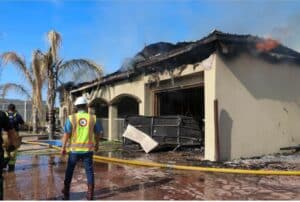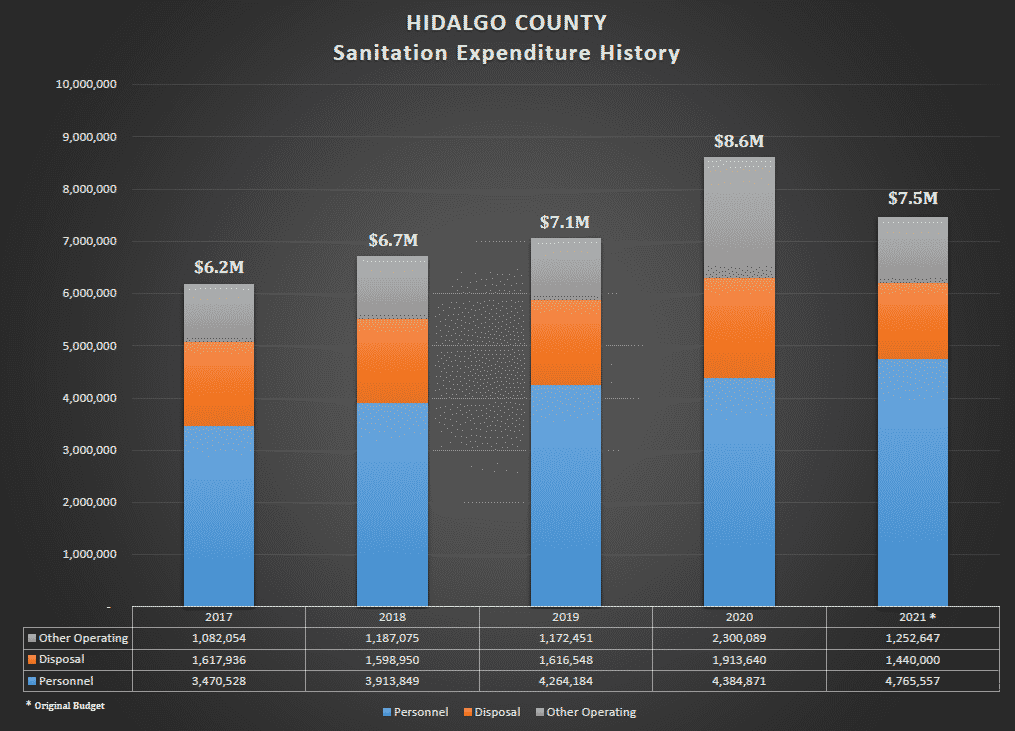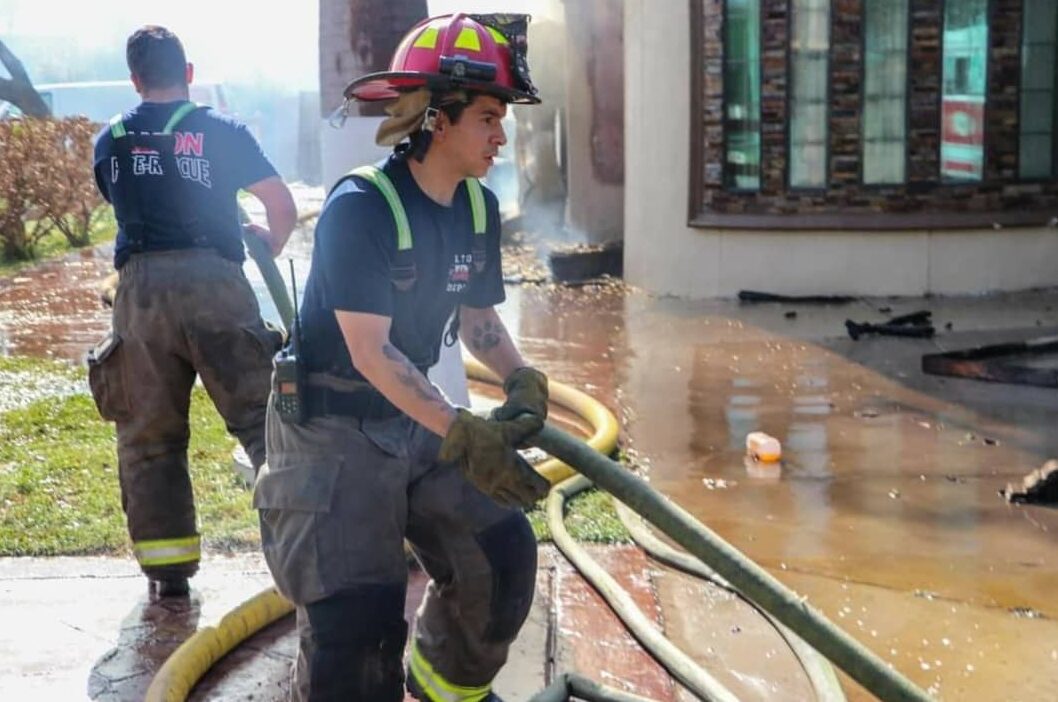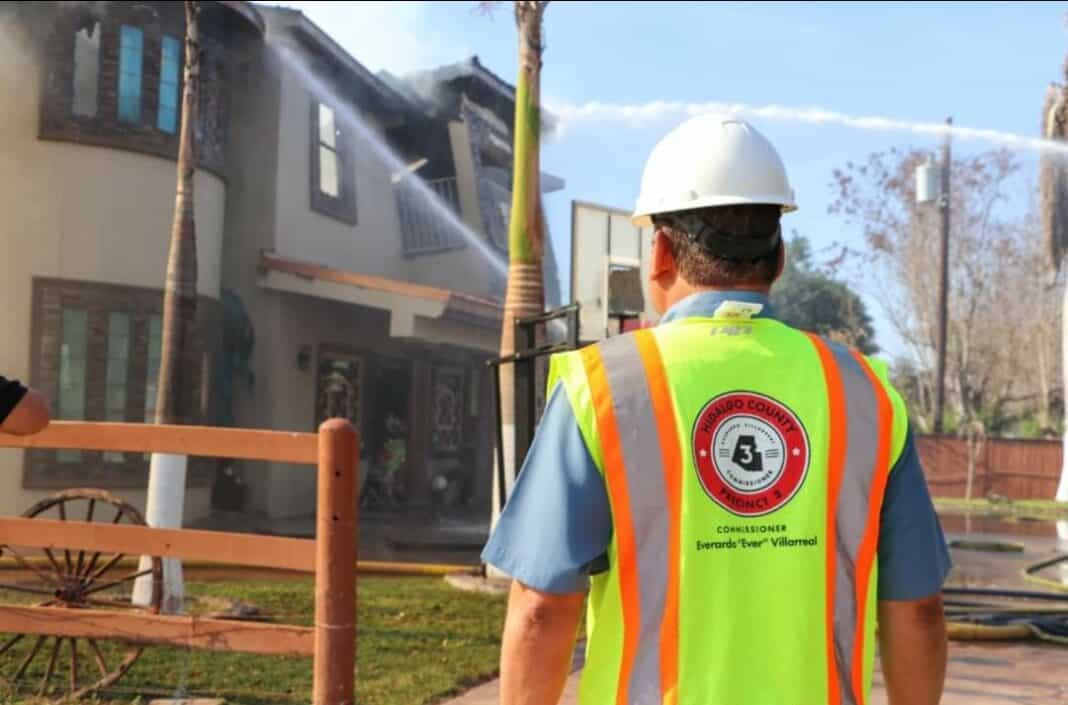
When several people in unincorporated Hidalgo County were clearing brush from a property Saturday, April 24, they decided to dispose of it with fire.
That choice, made during a burn ban, proved tragic for their neighbors.
The incident, which occurred at 5815 West 5 Mile Road in Mission, resulted in the total loss of 43-year-old Cosme Gomez’s business and home, where he and his wife and their four children lived.
Gomez was not at fault.
The fire jumped from his neighbor’s property after those people were burning brush causing a fire that got out of control.
Those people should not have been burning brush in the first place, but they also do not have trash or brush pick-up because they live in unincorporated Hidalgo County.
Aside from a few private businesses that conduct some trash pickup in unincorporated areas, Hidalgo County is prohibited by law from charging a fee to provide trash pick-up services in these areas, which creates a host of costly public safety problems for the county.
Those hazards, in addition to accidental fires rooted in trash burning, include illegal dumping, which results in clogged drainage systems and other health dangers, like water pooling in dumped tires — ideal breeding grounds for mosquitoes which sometimes carry viruses such as West Nile and Dengue.
Last year, the collection and disposal of trash in unincorporated areas cost the county $8.6 million, according to figures the county provided to The Monitor.

The county has no enforceable legal way to recoup any of those monies, which come from taxpayers.
Hidalgo County Judge Richard Cortez hopes legislation filed by Texas Sen. Juan “Chuy” Hinojosa that is co-sponsored by Senator Eddie Lucio can change that by giving the county a mechanism to levee a fee to approximately 60,000 households in unincorporated Hidalgo County for trash pick-up.
“What we did is we said ‘hold on just a second,’ let’s petition the State Legislature to put a bill that has been authored by Senator Hinojosa and co-authored by Senator Lucio to address solid waste issues in unincorporated areas to eliminate illegal dumping and burning, which poses a huge health and safety hazard,” Cortez said.
That’s Senate Bill 594.
On Friday, the legislation moved out of committee and is now waiting on a vote in the Texas Senate.
“Many colonias in Hidalgo County still experience inadequate trash collection or trash containers to dispose of solid waste causing an accumulation of excess garbage in and around the colonias. The lack of solid waste disposal services in these colonias results in increased pollution, illegal dumping, trash burning, and a health hazard,” the bill’s analysis stated.
That document notes that Hidalgo County is limited in its ability to provide solid waste services in extraterritorial jurisdictions of municipalities.
While they county can establish mandatory solid waste disposal services in its territory, Texas law denies Hidalgo County the ability to do so in a municipality’s extraterritorial jurisdiction.
“Some municipalities have taken the position that they possess no authority or obligation to regulate or provide such services beyond their corporate limits. As introduced, S.B. 594 seeks to remedy this situation by enabling the Hidalgo County Commissioners Court to establish a mandatory solid waste disposal program to provide waste services in colonias,” the analysis says.
Cortez said this week that the potential fee for such a service could possibly be somewhere between $25 and $30.
There would also be a penalty for non-payment, he said.

Right now, when the county goes into unincorporated areas to pick up trash, it can send someone a bill. But the way Texas law is written Hidalgo County has no way to penalize anyone who does not pay, Cortez said.
This proposed legislation would change that.
Cortez said if the bill is passed, the county may approach the unincorporated areas in a way similar to the colonia street light program.
“Basically, a neighborhood comes over and tells us, ‘Hey, we want street lights and we’ll pay X number of dollars to come do that,'” Cortez saw. “We in essence would be a conduit to provide the service to them and they agree to pay.”
However, the bill is not passed and Cortez said this is “still a work in progress.”
“We’re trying to develop and learn how to move forward providing these services because, like I said, counties aren’t designed for that type of work,” Cortez said.
There is precedent for this type of bill.
“This legislation is similar to legislation passed in 2017 for Webb and Bexar Counties. S.B. 594 authorizes the Hidalgo County Commissioners Court by rule to regulate solid waste collection, handling, storage and disposal by establishing a mandatory solid waste disposal program in the unincorporated areas of the county, including the (extraterritorial jurisdictions) of cities currently not providing dispoal services,” the bill’s analysis stated.
There would be some exemptions, including people who are in current contracts with private businesses for solid waste pickup or a private entity at a construction site that has a contract for roll-off container services.
During a public hearing Monday, April 26, four people registered their support for the legislation and two people from Cortez’s office spoke in support of the bill. No one testified against the legislation, according to Texas Legislature records.
One of the people who testified includes Cortez’s chief of staff, Isaac Sulemana.
“Unincorporated Hidalgo County is growing and straining our current sanitation framework. From 2017 to 2020 the Hidalgo County Sanitation Expenditures increased by 38% from $6.2 million to $8.6 million,” Sulemana said in testimony.
The county provided the newspaper a document containing Sulemana’s testimony.
“Beyond the financial aspect, we regularly come to the States Capitol seeking additional assistance for our communities flood mitigation infrastructure. Illegal dumping in the rural and unincorporated areas due to lack of access to solid waste disposal services regularly impedes our drainage system from functioning at full capacity. The actual cost of this flooding, and disease caused by stagnant waters and illegally dumped waste is beyond measure,” Sulemana said.
Sulemana noted that the legislation would not create an additional tax.
“This is not an additional tax but a service fee for an additional health and safety service which will be offered to Hidalgo County residents who currently may not have access to such services,” he said.
Sulemana said the legislation is critical for the county.
“The details of the program are still under development and have had been had with small local sanitation services providers and community advocacy groups to ensure we have a collaborative solution to our local issue,” he said. “The legislation is critical because regardless of the final organization of the program the ability to ensure collectability and resolution other than cessation of services is absolutely critical for any plan.”
Cortez said the proposal isn’t about needlessly charging people, either.
“We’re not in the business of cheating people or trying to make a profit for services … we are simply wanting to recover costs,” he said.
RELATED READING:
Family asks for help after burn ban violation destroys home, business




